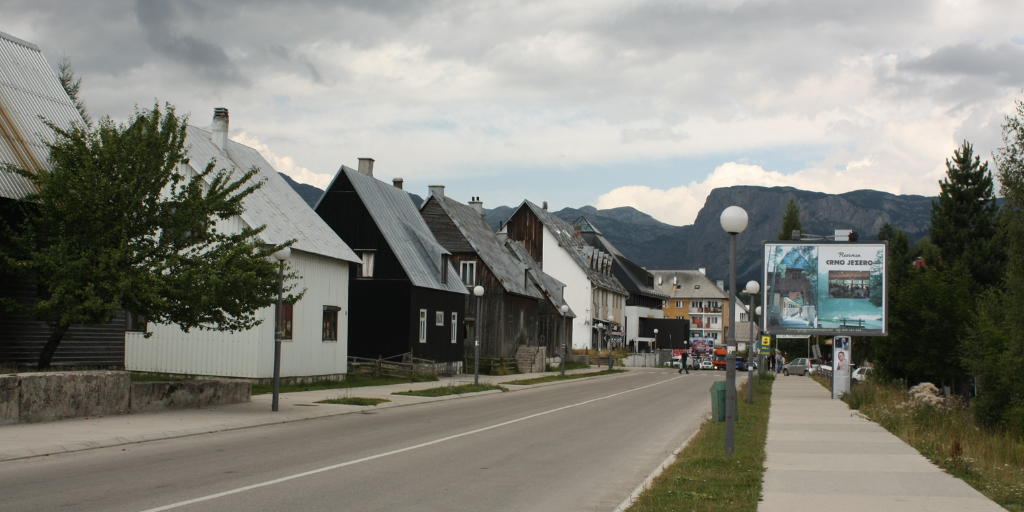As cities and towns across central and eastern Europe work toward decarbonising their heating systems, the need to deploy renewable energy alternatives in the sector has never been greater. The small town of Žabljak, nestled in the mountainous region of northern Montenegro, is at the forefront of this effort.
Nataša Kovačević, District Heating Campaigner for the Western Balkans | 5 October 2023

Žabljak, Montenegro - town centre, Mercy from Wikimedia Commons. CC BY-SA 3.0
Coal and wood heating no longer an option
Located 1,456 metres above sea level, Žabljak is the highest urban settlement in the Western Balkans, surrounded by the natural beauty of Durmitor National Park, a UNESCO World Heritage Site. The town is also the leading winter resort in Montenegro.
Due to its mountainous location, temperatures often fall below freezing during the winter months. However, Žabljak has no central heating system in place, which means that most households rely on firewood or coal for heating. This results in annual carbon dioxide emissions of about 1,121 tonnes. In terms of the cost of heating, burning wood and coal is generally the cheapest option in Montenegro. But the energy crisis in 2022, along with the resulting volatility in the national and regional energy markets, put decision-makers in Žabljak on red alert.
To put things in context, in 2021 the average price of heating wood was EUR 35 per square metre (m2) and pellets EUR 180 per tonne. By 2023, however, prices had surged to EUR 80 per m2 for wood. A year earlier, the price for pellets had reached as much as EUR 320 EUR per tonne. With heating demand in Žabljak now at 7,728 megawatt hours per year, this lack of stability has put the local economy and communities at risk.
A town with high ambitions
Back in 2019, the European Bank for Reconstruction and Development carried out a pre-feasibility study for a district heating development in Žabljak based on biomass and oil. But Žabljak Municipality had greener plans in mind. Determined to cut greenhouse gas emissions and improve energy efficiency, they want their district heating system to be powered by more sustainable and climate-friendly renewable energy. And so, Žabljak has turned to Actionheat.
Funded by the European Commission, Actionheat is a project that aims to accelerate the deployment of heating and cooling systems in cities across the European Union and the Western Balkans by facilitating the planning stage. Actionheat is set to provide Žabljak with much-needed technical assistance pre-feasibility . The municipality is now actively exploring more sustainable ways of optimising the district heating and cooling infrastructure in the region. They’ve decided to switch from fossil fuels to renewable sources, primarily harnessing solar energy alongside energy-efficient and energy storage technologies. This shift also involves a significantly reduced share of biomass compared to the previous proposal.
Renewable beginnings
The project kicked off this autumn with a meeting involving Bankwatch, Žabljak Municipality and the developers of an energy planning tool called Thermos. This open-source software visualises thermal energy demand in the form of automated maps, allowing users to compare a range of beneficial and cost-efficient options for heating and cooling distribution systems.
During the meeting, participants discussed ways of optimising network distribution, supply and demand estimates, supply parameters, and the reduction of emissions. They also explored the potential for carrying out a financial study and implementing a training programme to ensure accurate planning and the efficient use of resources.
The next steps will involve developing the training programme and collecting the additional data needed to make sure Žabljak’s district heating and cooling project is a success.
Setting an inspiring example
Žabljak is showing how even the smallest municipalities can implement decarbonisation plans by working together and making the best use of their resources. It’s also a welcome reminder for all stakeholders – from planners and technicians to local officials and community members – that shifting heating systems away from fossil fuels is entirely feasible.
By exploring renewable energy alternatives such as solar and energy-efficient technologies, municipalities can reduce their impact on the environment and attract investment from partners committed to sustainable development. Initiatives like Actionheat demonstrate the wealth of innovative options available. All that’s required is the courage and determination of decision-makers to lead the way.
Never miss an update
We expose the risks of international public finance and bring critical updates from the ground – straight to your inbox.
